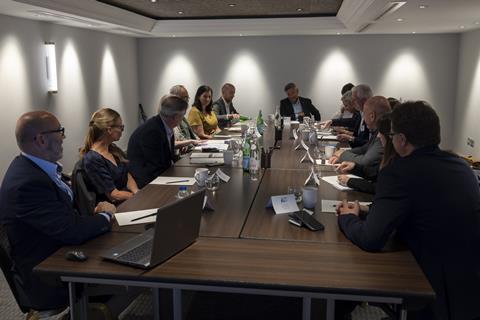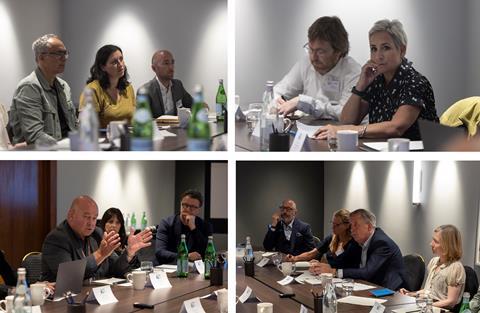Opportunities and challenges in the North-west region were examined in our latest ║├╔½Ž╚╔·TV the Future Commission regional roundtable, with the support of Willmott Dixon


The Greater Manchester area could be taken as a prime case study on the role that devolution can play within the built environment industries.
As such, it seems like the natural place to explore how construction and development opportunities can influence and help attain regional needs. In the words of Paul Mann, regional director for northern England at Gleeds: ŌĆ£WeŌĆÖve still got a lot to do as an industry, but that can be exciting if we can capture the opportunities. If weŌĆÖre going to keep evolving, now is the moment.ŌĆØ
Since the start of the year, the ║├╔½Ž╚╔·TV the Future Commission has been working to discover solutions and initiatives to improve the built environment. The project does not focus on one area but instead is divided into eight workstreams focused on different aspects of the industry.
As part of the commissionŌĆÖs fact-finding work, and in partnership with Constructing Excellence, we are going around the country convening high-level roundtable discussions with experts in different regions to ensure that the commission hears from all corners of the UK.
The first of these saw ║├╔½Ž╚╔·TV gather a group of experts who each had links to the East of England for a chat about skills in a region that some see as living in LondonŌĆÖs shadow, before the commissionŌĆÖs roadshow headed to Newcastle to hear from those in the North-east for a discussion about net zero and energy.
The third stop on the tour was Manchester for a discussion, sponsored by Willmott Dixon, all about the work opportunities for built environment firms in the North-west and how they can best deliver the regionŌĆÖs needs.
The North-west panel (listed below), chaired by ║├╔½Ž╚╔·TVŌĆÖs editorial director Chlo├½ McCulloch, was made up of construction leaders, all of whom have strong connections to the region and a high level of local knowledge and experience.
Attendees
- Chair: Chloë McCulloch, editorial director, Assemble Media Group
- Peter McDermott, board of directors, Constructing Excellence, and professor of construction management and procurement, University of Salford
- Katherine Kitchener, northern regional head of land and development, Willmott Dixon
- Paul Mann, northern regional director for cost consultancy, Gleeds
- Eamonn Boylan, chief executive, Greater Manchester Combined Authority
- Gwen Beeken, managing director, Osco Homes and Procure Plus
- James Blakey, planning director, Moda Living
- James Flannery, land and construction director, Sovini Group
- Nicola Hodkinson, director, Seddon
- Rob Hopkins, director of architecture, AHR Architects
- Richard Jones, northern cities executive, Arcadis
- John Marland, director of building and construction, Bruntwood
- Emma Porter, managing director, Story Contracting
- Ben Townsend, north-western director of new business, L&Q
A vision for the region
ŌĆ£One of the key things weŌĆÖre currently trying to finalise is the strategic framework for Greater Manchester, which is now with the planning inspector. WeŌĆÖre hoping to have a letter with any final tweaks and amendments shortly,ŌĆØ said Eamonn Boylan, chief executive, Greater Manchester Combined Authority (GMCA).
ŌĆ£Hopefully, that will start to really open things up in terms of future funding, not only for direct development but also to inform our discussions with major infrastructure providers who we need to influence to spend their investment programmes to support our growth agenda over time.ŌĆØ
The importance of local frameworks and plans was something reiterated by James Blakey, planning director at Moda Living. A key aim for his firm is to create developments in areas where people really want to live, and the placemaking ambitions of local authorities are key to that ŌĆ£in terms of their vision about how those places are going to be invested in not just in the short term, but the medium to longer term. We look to invest in areas which have got that vision, that passion to create places.ŌĆØ
Ben Townsend, director of new business at L&Q, said Greater Manchester is an example other areas should draw on. He said: ŌĆ£L&QŌĆÖs approach in the North-west ŌĆō and in London in the South-east ŌĆō shows how the delivery of strategic projects at scale can occur. We have got a clear placemaking strategy that weŌĆÖve demonstrated in the North-west and in London, and thereŌĆÖs huge potential for that to go further. In the North-west we are very keen to do that with public and private sector partners.ŌĆØ

Visibility of pipeline
A number of panellists said one of the key changes that could be made to support the North-westŌĆÖs built environment sector ŌĆō and the region more broadly ŌĆō is improving the visibility of upcoming work.
Katherine Kitchener, northern regional head of land and development at Willmott Dixon, said: ŌĆ£Early engagement and the pipeline management piece are significant. There is often a reluctance to engage early, so someone comes to you a week before and you can already see thereŌĆÖs all kinds of problems that affect your ability to meet that timeline and to work on that and take it forward.
ŌĆ£On top of that, a lot of the work we do is set within public sector funding which is reliant on this bid or that bid, and then they donŌĆÖt get it and the funding falls away. You then have to be careful about how much of your pipeline comes from that, as these things are so reliant on funding coming in ŌĆō and varying business cases, changing interest rates, changing political persuasions can all change that.ŌĆØ She added that there needs to be longer-term thinking in public sector plans.
Peter McDermott, who sits on the board of directors at Constructing Excellence and is a construction professor at Salford university, said: ŌĆ£We have really few public sector clients who say they explicitly want to get to know the markets and reduce forces that get in the way. Procurement vehicles have been developed in all shapes and forms, but a lot of frameworks really donŌĆÖt support the sector.ŌĆØ Frameworks are too often expensive to bid for, donŌĆÖt ensure a consistent workload or lack a quality guarantee, he said, adding that reform here is key.
John Marland, director of building and construction at Bruntwood, pointed out issues with the pipeline, saying there are often times when there is more work than the supply chain can deal with. ŌĆ£It canŌĆÖt all be feast or famine,ŌĆØ he said. ŌĆ£It is too hard for both clients and the supply chain to manage work when it is so cyclical and up and down. Clients canŌĆÖt bring forward projects if they are worried about supply chain security, and contractors canŌĆÖt increase capacity if they are unsure about work coming forward.ŌĆØ
Gwen Beeken, managing director of Osco Homes and Procure Plus, said the opportunities that retrofit presents ŌĆō from both a net zero and a building safety perspective ŌĆō will be key to future pipelines. ŌĆ£The risk and opportunities the retrofit agenda presents need to be balanced carefully,ŌĆØ she said. ŌĆ£There is obviously risk involved, but if we handle this carefully we will ensure we have the quality of stock required but also a secure pipeline of work.ŌĆØ
Upcoming ║├╔½Ž╚╔·TV the Future Commission events
21 September: West Midlands regional roundtable (by invitation)
27 September: ║├╔½Ž╚╔·TV the Future Conference (open)

The day will include panel debates on net zero, digital transformation and building safety as well as talks from high-profile keynote speakers on future trends and ideas that could transform the sector.
There will also be the chance to feed in your ideas to the commission and to network with other industry professionals keen to share knowledge.
5 October: Yorkshire and the Humber roundtable (by invitation)
25 October: Wales roundtable (by invitation)
Previous reports from the ║├╔½Ž╚╔·TV the Future Commission regional roundtables
>>Tackling the east of EnglandŌĆÖs construction skills challenge
Looking after the workforce
ŌĆ£The industry is second only to the military for divorces,ŌĆØ said James Flannery, land and construction director at Sovini Group. ŌĆ£That shows the pressure our staff are under. There are a lot of competing forces; itŌĆÖs an anxiety game, and we need to start having better ways of handling that.ŌĆØ Flannery said reducing the financial pressures on firms is the key way to improve staff wellbeing. For the SMEs that make up a majority of the construction industry to flourish and provide for their staff, there needs to be a reduction in tendering costs and improved timelines for creating bids.
A number of the panellists also raised concerns about staff training and wellbeing, with Nicola Hodkinson, director at Seddon, saying one key adjustment would be altering the typical approach of zero-hours contracts in construction (see solutions panel below).
Emma Porter, managing director at Story Contracting, added that while industry-wide wage growth would be ideal, there does need to be a consideration for how smaller firms and projects can compete for resources. ŌĆ£Wage inflation around major projects, such as HS2, mean that there can be multiple tiers of staff even within the same company, and that can cause problems,ŌĆØ she said. ŌĆ£We need to find a way that enables all firms to pay more equitably if we want to improve equality for all those working within the sector.ŌĆØ
Rob Hopkins, director of architecture at AHR Architects, said skills development is vital as we look to address issues such as decarbonisation. ŌĆ£I see both the challenge and the opportunity for our industry around skills development ŌĆō and particularly around carbon literacy,ŌĆØ he said. ŌĆ£At the moment we are charging people more to understand less about their project, and thatŌĆÖs certainly where I feel a lot of the issue around the cost of decarbonisation lies. By boosting these skills there will be a whole host of benefits.ŌĆØ
The solutions
As the roundtable approached its end after an hour and a half of enthusiastic debate, the panel were asked to come out with proposals for the ║├╔½Ž╚╔·TV the Future Commission. Responses (see below) included suggestions around encouraging and enabling the open sharing of information, how to enable change within the construction supply chain, and how to boost public and private collaboration.
The key takeaways for the commission from the North-west of England roundtable were around the importance of the industry collaborating and sharing best practice, investing in public sector resource and expertise, and clearly establishing the best way to deliver social value for local communities.
Ideas from the panel
- Deliver social value better
Paul Mann, regional director for northern England at Gleeds, highlighted the importance of delivering social value in a meaningful way. ŌĆ£We need to ensure the social value that is being delivered on projects in construction actually is making an impact on the local communities,ŌĆØ he said. ŌĆ£In some places that may be apprenticeships and in others it may be building additional community facilities. But what is key is that we are implementing ways of determining the right approach for individual projects, and that we check in after the project to measure how successful it is.ŌĆØ - Public and private collaboration
Richard Jones, northern cities executive at Arcadis, said public-private partnerships must become more open and transparent. ŌĆ£There needs to be a conversation about open dialogue to understand how the procurement bodies can work better with the supply chain. Even if they donŌĆÖt have the certainty, at least you can have the open, honest and frank conversation about it. Because that will mean you can make some better-informed decisions. The procurement rules are sometimes so strict, it doesnŌĆÖt allow that conversation to happen. So that needs to be addressed.ŌĆØ - Invest in public sector resource and expertise
The panel agreed on the need to invest more in public sector resources, particularly within planning departments, but also stressed that it is essential to use existing capability properly. Boylan said it is imperative that every new role is added in the right place, otherwise the roles will ultimately be stripped out in the future. - Sharing positive examples
The panel agreed that forums such as roundtables and industry events, especially events that dive into the issues of a specific region or topic, are key for highlighting best practice within the sector. They said this is integral for learning how common issues can be resolved, without having to reinvent the world. - Increase direct employment
Nicola Hodkinson, director at Seddon, said one of the core solutions for the industry in addressing challenges such as quality and approaches to sustainability is to increase direct employment. ŌĆ£One of the problems weŌĆÖve got as an industry with regard to quality is that we are not directly employing enough people and not training them properly. And weŌĆÖre not driving the quality because we canŌĆÖt with how our labour supply works.ŌĆØ She said we need to ensure all construction workers are on a reasonable living wage in order to truly be able to embed cultural reform.
The ║├╔½Ž╚╔·TV the Future Commission

The ║├╔½Ž╚╔·TV the Future Commission is a year-long project, launched to mark ║├╔½Ž╚╔·TVŌĆÖs 180th anniversary, to assess potential solutions and radical new ways of thinking to improve the built environment, with thanks to our national headline sponsors Fenwick Elliott and Gleeds.
The major projectŌĆÖs work will be guided by a panel of 19 major figures who have signed up to help guide the commissionŌĆÖs work culminatuing culminate in a report published at the end of the year.
The commissioners include figures from the world of contracting, housing development, architecture, policy-making, skills, design, placemaking, infrastructure, consultancy and legal.
They include Katy Dowding, executive vice president at Skanska, Richard Steer, chair of Gleeds, Lara Oyedele, president of the Chartered Institute of Housing, Mark Wild, former boss of Crossrail and chief executive of SGN, and Simon Tolson, senior partner at Fenwick Elliott. See the full list here.
The project is looking at proposals for change in eight areas:
- Education and skills
- Housing and planning
- Energy and net zero
- Infrastructure
- ║├╔½Ž╚╔·TV safety
- Project delivery and digital
- Workplace culture and leadership
- Creating communities
>> EditorŌĆÖs view: And now for something completely positive ŌĆō our ║├╔½Ž╚╔·TV the Future Commission
>> Click here for more about the project and the commissioners
║├╔½Ž╚╔·TV the Future is also undertaking a countrywide tour of roundtable discussions with experts around the regions as part of a consultation programme in partnership with the regional arms of industry body Constructing Excellence. There is also a young personŌĆÖs advisory panel.
We are inviting readers to submit ideas for how to improve the built environment which will form part of our Ideas Hub coming soon.



























No comments yet